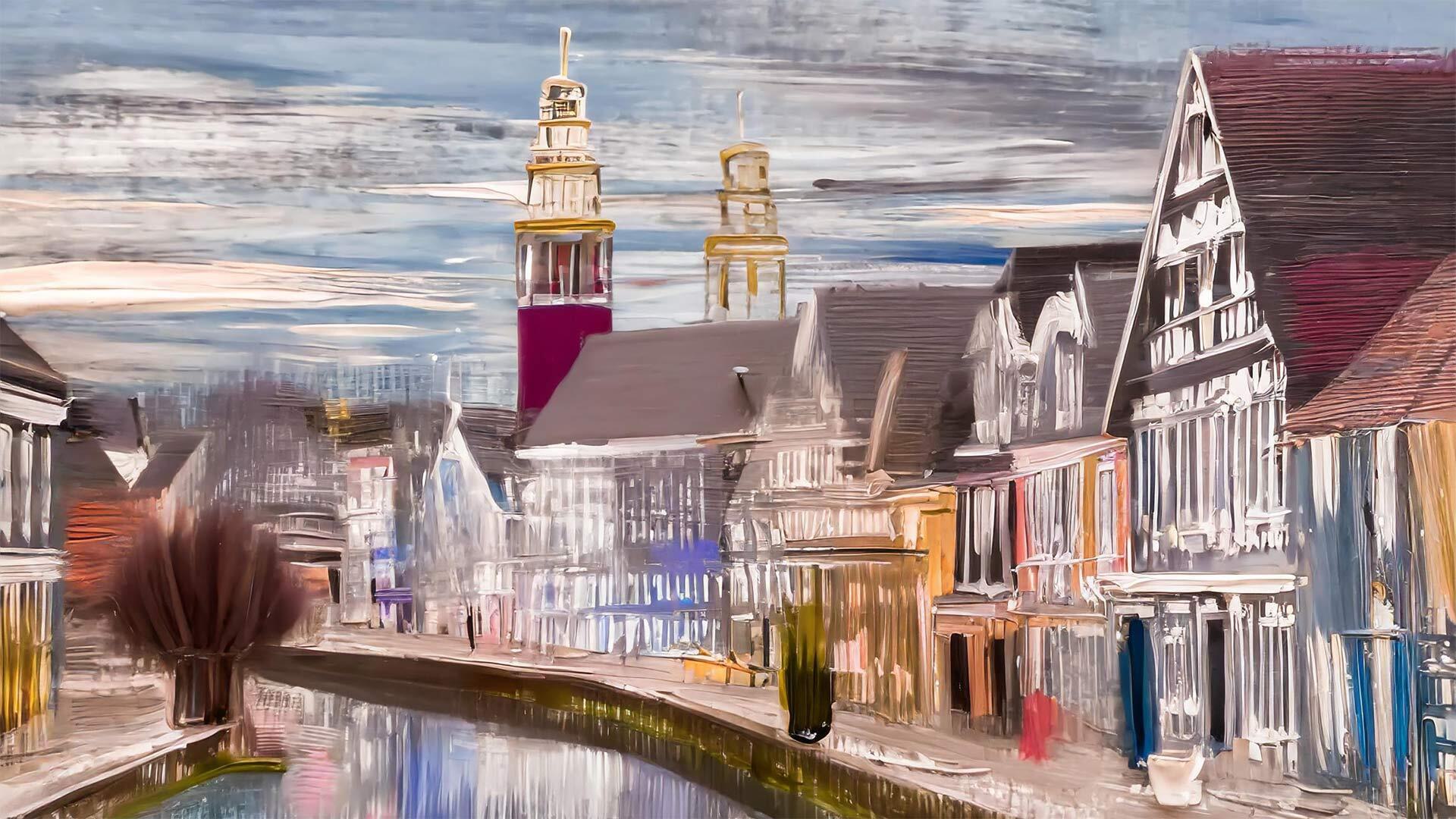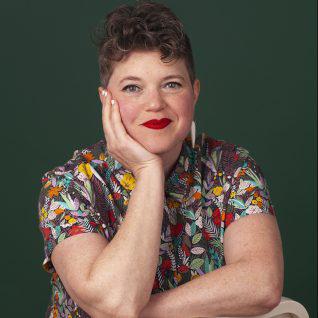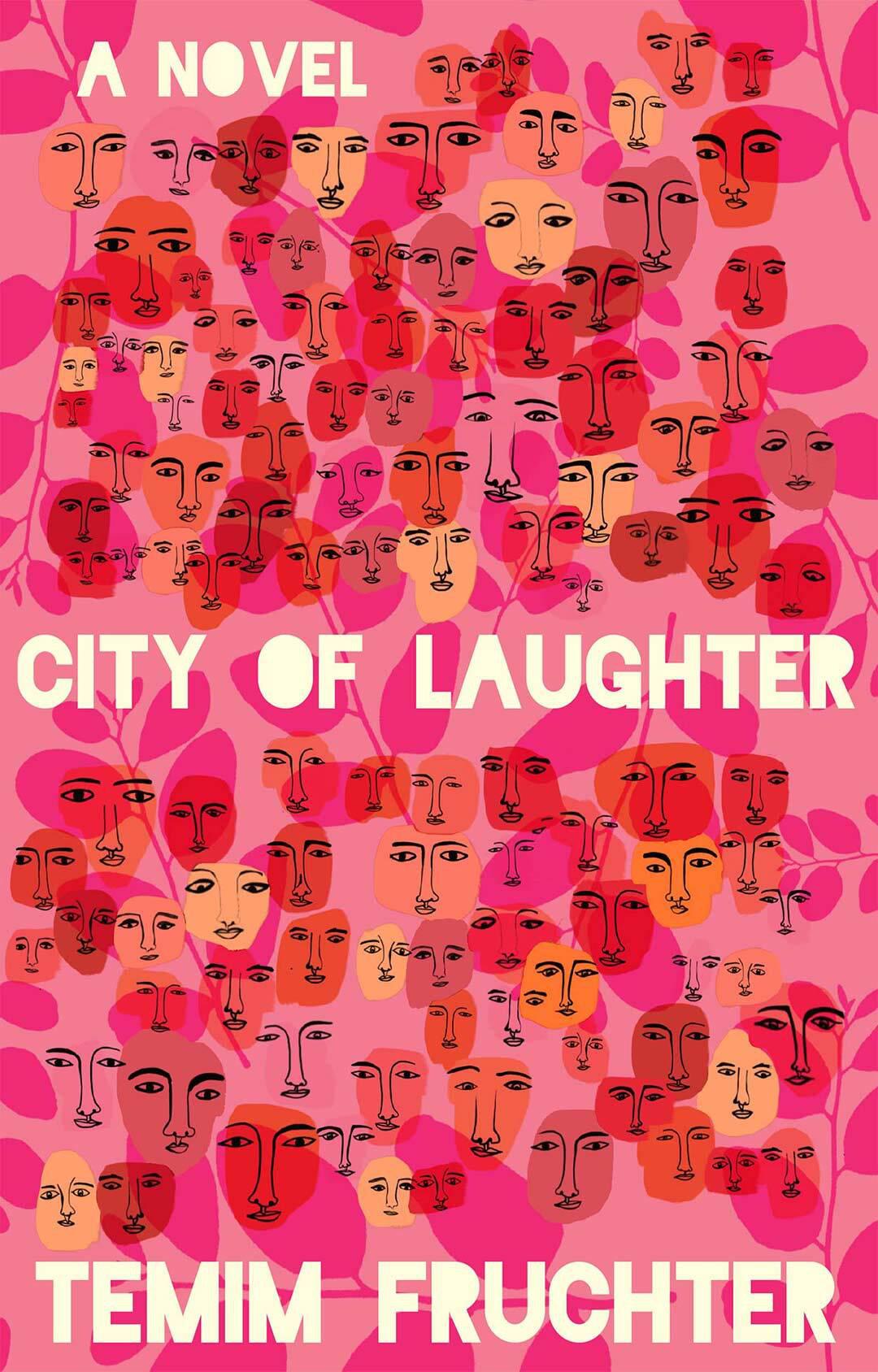Jewish Folklore Goes Queer in Alum’s New Novel
The Mystical and Mundane Meet in Story Inspired by Author’s Eastern European Family Matriarchs

In her debut novel, "City of Laughter," Temim Fruchter '02, MFA '19 writes a "speculative history" of a family much like her own: orthodox Jews of Eastern European descent. Both Fruchter and the book's protagonist eventually travel to their family's Polish hometown, Ropshitz, depicted here via AI rendering.
Image generated by Adobe Firefly; book cover/head shot courtesy of Grove Atlantic
In 2011, Temim Fruchter ’02, MFA ’19 was on the road drumming with the Shondes, whose name ("disgrace" in Yiddish) was a wink to the group's unholy blend of rock, punk and klezmer-inflected music—and the queer, leftist makeup of its members. During a stop in Warsaw supporting the act’s second album, Fruchter realized she was only a few hours from a place that had long lived in her imagination: Ropshitz, once home to her great-grandparents and beyond.

When she detoured to the town of 15,000 in southeastern Poland known there as Ropczyce, Fruchter was struck by a dual feeling: that the area was filled with ghosts, the air around her electric with the spirits of her ancestors—and that she had no particular connection to the sleepy burg.
“I was really interested in that duality of being a diasporic Jew” who wasn’t sure whether she was feeling a genuine bond with her ancestral homeland, or just wished she was, Fruchter said. “I think a lot of people experience some version of that.”
Fruchter’s exploration of that confusion resulted in “City of Laughter,” her debut novel published by Grove Atlantic last week. Part folk tale, part queer romance and part family saga, the book tells the story of Shiva, a young Jewish woman figuring out her place in a long line of complicated matriarchal figures, each carrying the sense that they’ve been touched by something mystical.
Her journey, like Fruchter’s, eventually takes her to Ropshitz, described in the novel as “a pious place, for the most part. God-fearing. Benevolent windows and awestruck rooftops. Only a handful of trees, but all of them bowed and bent in the face of the diffuse divine.”

The novel contains many autobiographical elements: Like Shiva, Fruchter grew up in a religiously observant but “permissive” Orthodox household in Silver Spring, Md. Her mother was an art teacher, her father a musician, and on Friday evenings, the family would sit around the Shabbat table reading from anthologies of Jewish folklore. The stories “made the world feel impish and playful,” said Fruchter.
Still, there were rules to be upheld. Her family strictly followed the dietary laws of kashrut, eating out only at certified kosher restaurants, and kept Shabbat, abstaining from any use of electricity or technology from Friday evening to Saturday evening.
At the University of Maryland, Fruchter began “asking a lot of questions about queerness, about Zionism, about Judaism, about my practice,” she said. “Meeting different kinds of Jewish people permitted me to experiment more.” In a recent op-ed for The New York Times, Fruchter wrote that she began to eat non-kosher food, “daring God, saying, ‘Hey, look what I can do.’ But God didn’t flinch.”
After graduating with an English degree from UMD, Fruchter moved to Brooklyn and found a community of “radical Jews” who imbued their personal and professional lives with an unconventional Judaism. She joined the Shondes, which earned some fame both for its music and its politics. (Fruchter is no longer in the band.) Today, she describes herself as “ex-Orthodox” and queer and works full-time as an executive assistant at an education nonprofit. Fruchter returned to UMD in 2017 for her MFA, an experience she described to the Washington City Paper as “a really generous, kind and mutually supportive space, and a very inquisitive workshop.”
“City of Laughter” weaves together many of these threads from Fruchter’s life. Raised by religious parents, Shiva has always sensed that her mother, grandmother and great-grandmother held familial secrets dating back to the family’s time in Poland, where they were descendants of healers, storytellers and badchanim, wedding jesters whose job was to delight brides, grooms and their guests (and who put the “laughter” in “City of Laughter”). As Shiva delves into their history, and as reality and the supernatural intertwine, she mines the layers of generational trauma that her family has carried.
“My book isn’t to say all of my ancestors were secretly queer, but if they had been, I wouldn’t have known, because queer and trans histories are so often hidden or erased,” said Fruchter. “And Eastern European Jewish histories have so often been lost to us. It just got me thinking, what would it mean to have my queerness mean something more multi-generational? And because it’s all speculative and imaginative, I used this rich universe of Jewish folklore to build a universe in this book where those kinds of possibilities are real.”
Fruchter’s distinctive blending of past and present, real and mythical has garnered praise, including a starred review in Publishers Weekly and a New York Times review calling her novel “brainy and textured.”
“Bringing a queer sensibility and a deep understanding of Modern Orthodox Jewish tradition to novel writing, Fruchter asks whether comfort in mystery is a viable alternative to standard happy endings or bleak fates,” wrote Lauren LeBlanc in the Times. “‘City of Laughter’ argues that flouting convention makes space for more authentic, expansive stories and more authentic, expansive lives.”